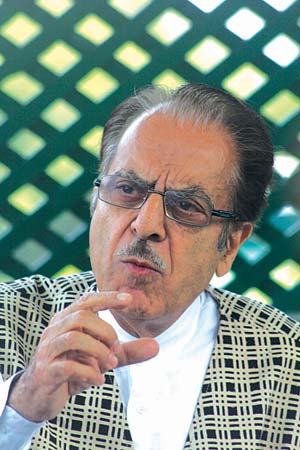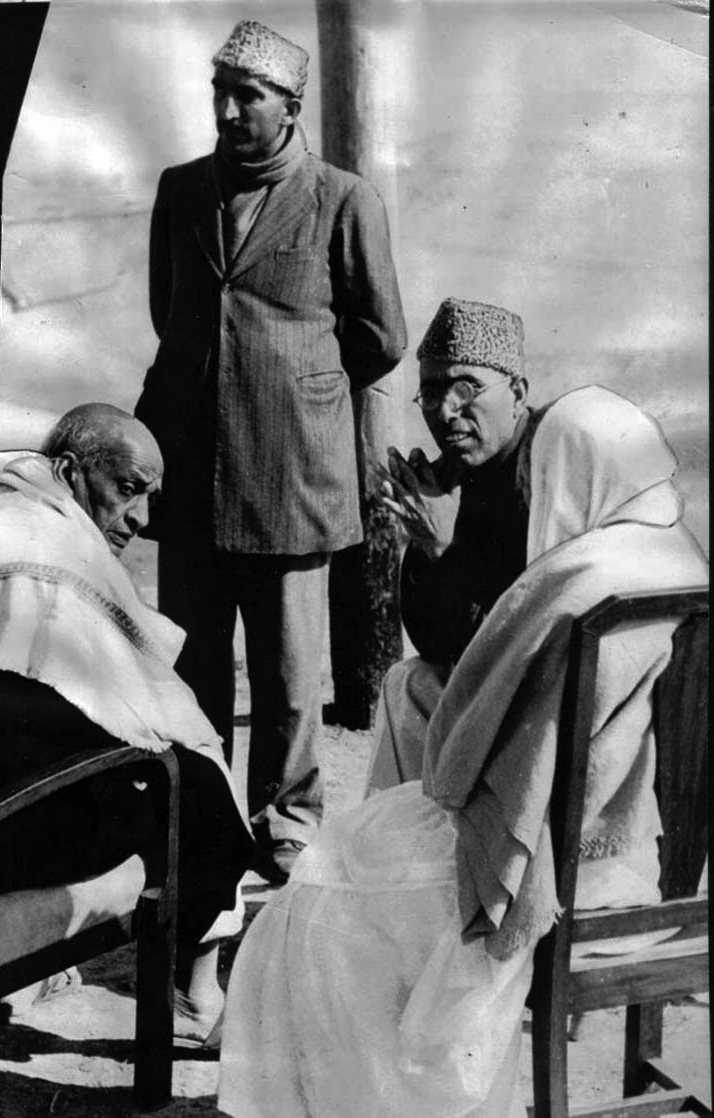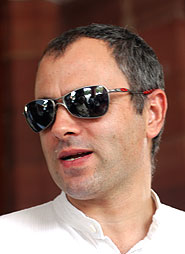Six politicians from J&K will join the Indian parliament this week. Eighty four have been elected in the last 14 parliamentary elections. Forget about resolving the Kashmir dispute and raising it in the parliament. Have they been able to move a single bunker in Kashmir? Have they been able to help a single Kashmiri family get justice? R S GULL finds out.

On the evening of April 14, 1999, Saifuddin Soz was a deeply troubled man. India’s first Hindu nationalist government led by the Bharatiya Janata Party stalwart, Atal Bihari Vajpayee was facing a no-confidence motion. The fear of small numbers was haunting the coalition partners, among them the National Conference (NC), which was going to support the Bharatiya Janata Party (BJP). NC chief Farooq Abdullah was conscious of the reluctance his MPs might have in voting in favour of the BJP. An anxious Abdullah arrived at Soz’s residence to ensure Soz was following the party line. “Dr Abdullah insisted we go with the BJP,” Soz recalled. Abdullah was worried about his relationship with the BJP leaders. “But his decision was against the ideology of the National Conference. How could we support a communal party,” Soz added.
Soz owed much to the Abdullahs. Sheikh Abdullah had handpicked him to represent north Kashmir in the parliament in 1983. The college professor had risen to be one of the most prominent faces of the NC. Soz debated with himself. He knew voting against would have consequences.

The next morning Soz chose his conscience over his party and voted against the BJP. India’s first BJP government collapsed in a moment. A few days later, NC expelled Soz, forever. But Soz had won millions of hearts across the subcontinent by helping pull down the party that rose to power on anti-Muslim rhetoric, on the broken domes and columns of Babri Masjid, on the frenzied communal violence in the aftermath of December 6, 1992, which destroyed thousands of families. If a single vote could seek democratic revenge for such murderous chauvinism, none could do better than Soz. No vote polled by a Kashmiri has added to as much in electoral history.
Soz does not see his “vote of conscience” as his contribution as a Kashmiri representative in the Indian parliament. He has been elected four times to Lok Sabha and nominated three times to the Rajya Sabha. He has spent most of the last 30 years on Parliament Street. “In 1990, when Dr Farooq Abdullah was in London and Mufti Sayeed was nowhere, I raised the question of rape by army men in Kunanposhpora in the parliament. I was the only one who cried in the parliament about setting afire a bus along with passengers in Kangan. Those days I was the only politician in Delhi, who spoke about the human rights situation in Kashmir,” Soz said. His interventions barely added to the cries of help that were emanating from Kashmir.
Tragically, however, it had no impact on policymaking. Instead of any pro-people shifts in the policy that was in vogue then, the subsequent years saw approval to a much bloodier crackdown. But Soz deserves credit for bringing a host of infrastructural projects to J&K, including the Dal Lake maintenance project, the extension of railways and building of a new airport.
Senior journalist, Mohammad Sayeed Malik, who has followed Kashmir politics for several decades believes parliamentarians should be judged by the context of their times, “not by parameters that are more relevant today.” One of the earliest parliamentarians from Kashmir was Moulana Sayeed Masoodi. A follower of Hussain Ahmad Madni, Masoodi had the reputation of being “Delhi’s man” in NC. Even Sheikh Abdullah, in his autobiography, has accused the cleric of being part of the conspiracy that led to fall of his government and subsequent arrest in 1953. Masoodi remained part of the NC but was always a suspect. But he was one of the four members who represented J&K in India’s constituent assembly and has played a vital role as a member of the committee that drafted the Article 370.
Apart from the four-member team that represented J&K in the constituent assembly, J&K has sent 84 ‘representatives’ (excluding Rajya Sabha members) to the last 14 parliaments.

But quite a few have delivered and most were blinded by the aura of their tiny corner in the parliament. One of the best-known names in Kashmiri politics—a man both likebest-knownised–Bakhshi Ghulam Mohammad is the source of many stories in Kashmir. Bakshi Sahib appointed Tehsildars, signing orders on the back of cigarette covers; Bakshi Sahib made paupers into landlords by leasing them plots of expensive land. He unleashed his clan on the businesses forcing partnerships on entrepreneurs. He organized his cadres into gangs, called Gouga, who were the law unto themselves and eventually helped the regime to sail through. But there is hardly anything to say about Bakhshi as a Member of the Parliament.
After Bakhshi, one of the biggest names from Kashmir who went to the Indian parliament was the renowned journalist, Shameem Ahmad Shameem. Shameem was elected an independent member to the fifth Lok Sabha from March 1971 to January 1977. He was in the parliament at a time when Kashmir was fading out and tensions were on the rise in East Pakistan as the oppressed Bengalis began a struggle for a separate country: Bangladesh.
Shameem, who was moved by the sabotage of democratic verdict in Pakistan, was a fierce supporter of Bangladesh movement. “He believed that if you are fighting for the right of self-determination, you must support other movements launched for the same cause,” said Malik, his relative and contemporary. But the idea was turned down because Sheikh did not see the similarities between the two cases. Shameem had won the election independently with the “unconditional” support of the Plebiscite Front. But his contemporaries insist that he had made it abundantly clear that he lacked any compatibility with the Front’s ideology.
Once when Shameem was talking in the parliament about the aversion of some Delhi politicians towards Ghulam Mohamad Sadiq’s idea of reviving Naya Kashmir, the NC manifesto, when Congress MP, Bhagwat Jha Azad accused him of being a Pakistani agent.
An angry Shameem slipped in a moment of unparliamentarily behaviour and threw his mike at Jha.
Shameem made a name for himself during the emergency as a strong voice against Indira Gandhi’s authoritarianism. Though the issues pertained to the whole of India, his speeches were finding relevance in Kashmir, where Jamat-e-Islami was banned, its schools closed down, and censorship imposed on the frail media.
There is also the question of what Kashmiris expect from their men in the parliament. Abdul Rashid Shaheen, two-time National Conference MP from Baramulla. “People think the MPs would get them bridges and roads,” rued Shaheen. Not quite! “There should not be any harm in asking questions about civil liberties. How many youths are in jails outside J&K? How many of them are facing trial and how many of them are convicted?” said Abdul Gani, a school teacher. “What about the action taken by the government of India against the members of the military and paramilitary forces charged with involvement in human rights violations?” There is no credible record of such things. The statistics offered in the state legislature are confusing and change with every regime.
The rare case was in 2003 when an NC MP (Rajya Sabha) Mirza Abdul Rashid asked how much land the security forces in the state occupied. He was informed that the army and the paramilitary forces together have acquired 41594.767 acres of land in J&K. Though officials in the state said it must be more, given the state of Ladakh where the army had requisitioned 4354 acres and acquired 786 acres and was in illegal possession of 51459 acres, the response had already become a researcher’s reference.
Disillusionment with the performance of the MPs runs deep into the state bureaucracy as well. “For the last many years various Delhi politicians and journalists have been saying that massive investments are made by Delhi in Kashmir, especially the Prime Ministers Reconstruction Fund (now re-valued at Rs 29000 crores). “But no MP has asked that if two-thirds of the package is being spent on NHPC why should it be named a package for Kashmir,” a bureaucrat said.
But Shaheen refutes the allegations. “I have asked 700 questions in my two stints. Does anybody know,” he said. In 2002, he remembers when RSS activists had converged in Jammu and had flown in a large number of Buddhist activists from Leh to launch a joint movement for trifurcation of the state, I asked the government in the parliament and it had an immediate impact. “Lot of cops were sent in civvies to Jammu who dismantled the camp and drove the RSS activists outside the state”, he said.
“Prior to that, I had asked the Prime Minister (in an all-party meeting) that, it seemed as if he was presiding over the division of J&K,” Shaheen said. His efforts brought the Horticulture Technology Mission to J&K only after the issue was constantly raised in the parliament.
Shaheen explained why many questions about Kashmir are asked by non-Kashmiris. “If I ask certain questions directly, I may not get proper response and even at ground zero, our workers could face problems. So what we do, we ask questions about other areas in lieu of them asking about our problems,” he said, indicating he had an arrangement with AGP and TDP.
At times, he said the government back home is not supportive. “When the finance minister said they have a lapsable account for northeast grants, I asked for the same facility for J&K because we also are a category state. But tragedy was that neither my own government led by Dr Farooq Abdullah supported me nor the coalition government of Mufti Sayeed.” Shaheen consoles himself with the thought of a bill on Auqaf, he helped draft as the chairman of a subcommittee on Auqaf. “It is a law that will eventually help the Indian Muslims,” he said.
Shaheen was dropped by the National Conference and replaced by Shareef-ud-din Shariq this time. He sees his political activism as the reason. “I was punished for a speech I delivered at the peak of Ragda campaign in which I told the central government not to resort to Hindu aggression,” Shaheen claimed.

Yet Shaheen’s party chief Omar Abdullah riveted the parliament with his speech on the trust vote following the nuclear deal with the United States. “I am not a member of the UPA and don’t aspire to be one. I made a mistake to be with the NDA, especially after the Gujarat riots happened. My conscience had asked me to quit NDA but I didn’t. My conscience has still not forgiven me,” Omar thundered, waving a fist. “I am a Muslim, and I am an Indian. I see no distinction between the two. .. I see no reason why I, as a Muslim, have to fear a deal between India and the United States of America (USA). .This is a deal between two countries. It is a deal between, we hope, two countries that in the future will be two equals”. He said the Hindu pilgrimage to Amarnath will continue but “not a single inch of land will be conceded”.
The speech had such impact that many in Congress began seeing him as “future leader of Indian Muslims.” It also ensured him great support from the Gandhi family in the government formation in Kashmir.
But Omar hasn’t done much for Kashmir in the parliament. Mostly Omar spoke in the parliament either as the junior commerce minister or the junior foreign affairs minister. The tragedies and needs of Kashmir seem to have failed to evoke the passions of identity that saving the Congress government evoked within Omar.
The parliamentarians from Kashmir seem to have made little impact, partly because of their small numbers. “For most of the previous parliaments the Congress was ruling at the centre and the state, so there was no possibility of being very pro-active,” says Wani, “It was only after the start of coalition politics in the eighties that even small-sized states started to matter. You know even one vote cost a government.”
But in our times, when the coalition politics and decentralization of the power in India is a set fact, the MPs from Kashmir rarely articulate their political positions. “NC stands for autonomy and PDP for self-rule but check the records and see how many times their members in parliament raised these issues,” Wani said, adding that the same faces are vociferous over these issues in the state legislature where such debates hardly matter. “They skip those issues because they are afraid of being alienated in the house.”
Expectations from the latest round of representatives to the parliament are low. “Who amongst them has the capacity to take his job seriously? Among the possible winners from all the three constituencies, whoever has the capacity lacks the will and those who would love to do things don’t have the capability,” said Shakeel Ahmad, a government employee.















